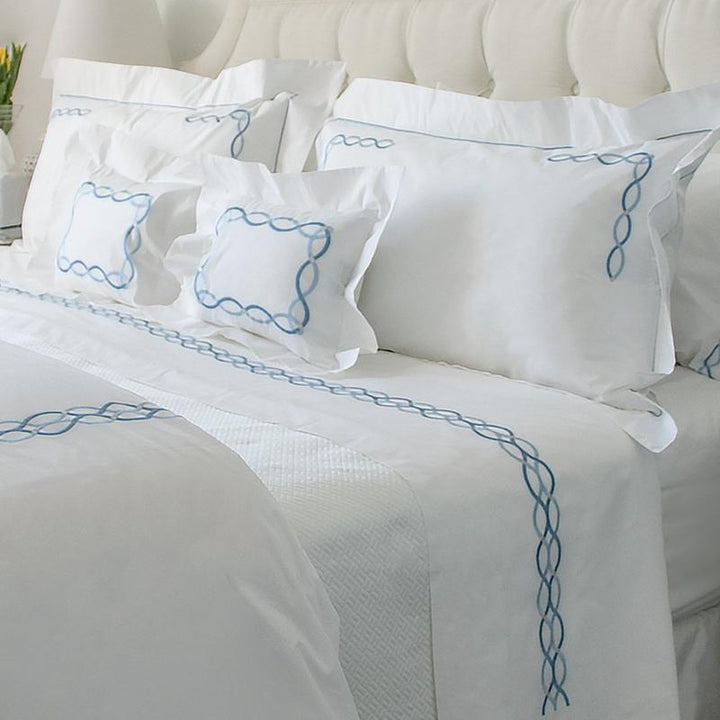At Pioneer Linens, we often have customers picking between two different types of bedding, cotton sheets and polyester sheets. There are many key reasons to pick one over the other, and picking the wrong one could mean a lot of sleep discomfort. Let us go over the major differences between the two of them.
Differences Between a Cotton and Polyester Sheet
Typically, cotton is organically grown as a plant. The cotton fibers are spun into varying weave styles by machines, usually in percale or sateen. Polyester sheets aren’t grown from a plant but rather are made from petroleum-based compounds being processed then spun into threads.
Cotton also has extremely tiny openings, which allows for water absorption and moisture wicking, making it perfect for night sleepers. Polyester doesn’t have such openings; this however allows it to be more efficient at trapping heat.

(Two Tone Chain Bed Linens by Pioneer Linens Signature Collections)
Pros and Cons of Cotton Sheets
Starting with the upsides, cotton sheets are generally softer and more breathable than other material options. As stated before, it’s extremely efficient at absorbing liquid, being able to hold 27 times its own weight in water. Cotton is normally hypoallergenic, making it perfect for those with sensitive skin or are allergic to polyester. Another benefit to cotton sheets is that they get softer with every wash.
One of the downsides to cotton may be just how absorbent it is. If your cotton sheets absorb too much sweat and stains, it can reduce their overall lifespan. To avoid this, make sure that you wash your cotton sheets at least once a week, twice if you’re prone to night sweats. Some lower quality cotton sheets are also prone to wrinkling.

(Apollo Stripe Matelasse Coverlet by Matouk Collection)
Pros and Cons of Polyester Sheets
Because of how polyester sheets aren’t made organically like cotton sheets, they are usually thought to be lower quality, but there are times where it’s upsides make it the better choice. For starters, polyester is much more durable and less likely to rip and tear than other materials like cotton, silk, or linen, making it easier to take care of and maintain. It doesn’t lose its shape or color easily, nor does it shrink it the wash like cotton sometimes does. Though polyester doesn’t start off as smooth or silky as cotton, it does still soften over time. Polyester also typically costs less than cotton sheets do.
Regarding its downsides, polyester isn’t as absorbent nor breathable as cotton is. It traps heat, which can be beneficial during the winter, but not so much during other seasons, or if you’re a hot sleeper. If someone is allergic to polyester, they may find it irritating for their sensitive skin.
Polyester or Cotton: Which is Better for You?
When picking out new bed sheets, it’s important to keep in mind the advantages and disadvantages to each material. Sometimes the wrong bed sheet can be detrimental to your sleep.
If you’re looking to have an easy-to-care for bed sheet or don’t have any issues sleeping hot at night, polyester is likely the material for you, but if you do have problems with night sweats or would just appreciate the additional comfort, cotton may be the better option for you. If you're looking for a middle-of-the-road option, you can pick a cotton/polyester blend and get a bed sheet that is reasonably decent on all fronts.
(Positano Hemstitch Bed Linens by Matouk Collection)
What to Expect from Pioneer Linens
Our team is dedicated to providing you with the best service possible. That means helping you find the brands and styles you want, for the product you are looking for. If you have any more questions or need consultation about any of our cotton or polyester sheets, call us at 800-207-5463 or email customerservice@pioneerlinens.com.






